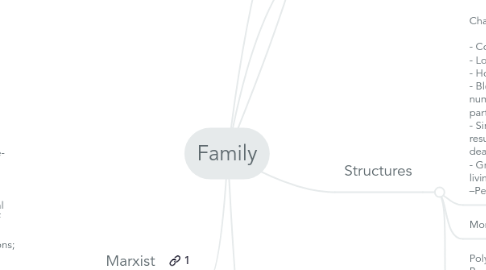Family
저자: Emma Dillon


1. Other Key Factors Affecting Irish Families
1.1. 1. Industrialisation –Shift in the economic base from jointly operated family enterprise to individual wage and salary earning –Consequences of these shifts effected parent-child and husband-wife relationships
1.2. 2. Emigration –Effected the Irish family through its influence on the structure of the Irish economy –Effects on family relationships
1.3. 3.Cultural influences –Previous emphasis in Catholicism on traditional family morality is presently challenged by the changed role of religion in Irish society
1.4. 4.Role of the Irish State –Maintaining the physical and cultural ‘quality’ of the family •Through family law and social policy •Through state support for aspects of ‘traditional’ family principles
1.5. 5. New patterns of behaviour in family life represent diversity in views on what is healthy and/or acceptable
2. Marxist
2.1. - Property and Inheritance- inequality reproduced - Patriarchy - Labour Power - Race and ethnicity: social placement in structures of inequality - Safety valve for frustrations; power within families - Props up capitalism - Reproduces labour force - Socialisation Ideological Dimension
2.2. Criticisms
2.2.1. - Over focus on class nature of exploitation - Patriarchy predates capitalism and should be given more significance
3. Definition
3.1. Family "includes adults of both sexes, at least two of whom maintain a socially approved sexual relationship, and one or more children". Murdock (1949) went on to describe four main functions of the family which included: sexual relationships, economic cooperation among members, reproduction, socialization of infants and children.
4. Types
4.1. - The Nuclear Family - The Extended Family Classic extended family Modified extended family - Single Parent Family - Reconstituted Families
5. Structures
5.1. Changing Structures - Cohabiting (unmarried) couples - Lone parents (never married) - Homosexual unions - Blended families (resulting from a number of relationships involving different partners) - Single-parent families (as a result of divorce, separation, death) - Groups of unrelated people living in a ‘family’ arrangement –People living alone
5.2. Monogamy - One man, one woman
5.3. Polygamy- Parts of Egypt, Saudi Arabia. Practiced illegally among Mormans. Two forms: – Polygyny- one male and two or more females. – Polyandry- one female and two or more males.
6. Functionalism
6.1. - Socialisation - Regular sexual activity - Social placement - Material and emotional security
6.2. Criticisms
6.2.1. - Sexual relations outside marriage - Socialisation of children outside the traditional family - Violence in the home-dysfunctional - Sexual relations outside the family - Production of mental illness (Sclater, 2000) - Role of other institutions to meet human needs
